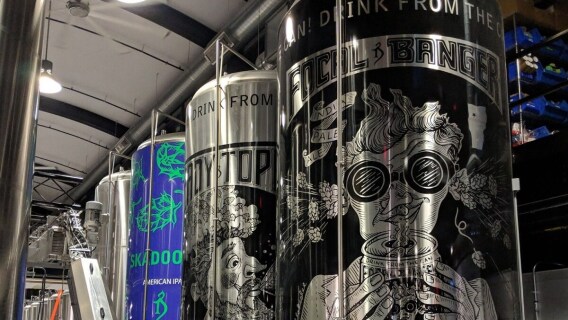A little under 10 years ago, Ballast Point Brewing made a huge splash when it was acquired by Constellation Brands (STZ) for $1 billion. This was the largest ever deal for a craft brewery at the time and, by all appearances, is the high-water mark for the industry as a whole.
A mere four years later, Ballast Point would be sold again, this time to Kings & Convicts Brewing for what industry observers estimated to be between $75 and $200 million. This remarkable fall from grace would soon be followed by the pandemic and the associated disruptions to bars, restaurants and events – all of which hit the bottom lines of alcohol companies and beer stocks.
At the same time, the shifts in consumer habits that were already underway began to accelerate, with a larger and larger share of the population opting to ditch alcohol – some, in favor of increasingly legal cannabis, and some foregoing substances altogether.
In fact, a recent survey from Monitoring the Future has found that, in the last 50 years, the percentage of high school students who reported no alcohol, tobacco, or marijuana consumption in the last 30 days has risen from 5% to almost 40%.
Not surprisingly, then, non-alcoholic beers have been one of the fastest-growing segments of the brewing industry, with grocery store sales rising 35.5% last year and non-alcoholic beers now accounting for more than 3% of total sales.
In something of a poetic twist, the country’s largest non-alcoholic brewer, Athletic Brewing, recently took over the headquarters of Ballast Point, which has now been relegated to contract brewing, tacking the brand onto brews provided by an undisclosed brewing partner.
So, given the chaotic background of American beer production and consumption, have any beer stocks reached a compelling valuation?
[text_ad]
Let’s take a look at the three beer and alcohol companies behind America’s most beloved brews and see.
3 Beer Stocks Behind America’s Favorite Brews
We’ll start with a brief look at the performance of the three beer stocks that collectively own or distribute America’s most popular beers.
| Company | Ticker | YTD Return | 1-Year Return | 5-Year Return |
| Constellation Brands | STZ | -1.2% | -11.9% | 23.6% |
| Anheuser-Busch Inbev | BUD | 7.5% | -6.3% | -38.5% |
| Molson Coors | TAP | -13.9% | -18.8% | -0.1% |
Constellation Brands (STZ)
Constellation Brands owns the U.S. distribution rights to Corona, Pacifico and Modelo, the most popular beer in the U.S. However, global distribution rights for Modelo belong to Anheuser-Busch Inbev SA (BUD), which we’ll touch on later.
Constellation is also the largest domestic importer by volume and has the third-largest market share of all major beer suppliers. And, in terms of the stock, it’s the only name on the list to post positive five-year returns.
STZ currently trades with a trailing PE of 17.9, compared to an average PE of 17.3 for the beverages-brewers subsector, and offers a 1.7% dividend yield.
While shares have dipped in the last year, they were trading at all-time highs earlier in 2024 and remain in a slow but steady uptrend.
Anheuser-Busch Inbev SA (BUD)
Anheuser-Busch is the largest company in the subsector, with a market cap of $119 billion, nearly triple that of Constellation’s $43 billion.
This global conglomerate is also the largest brewer in the world and its portfolio of brands includes Budweiser, Bud Light (formerly the most popular beer in the U.S.), Busch, Michelob and Stella Artois, among others.
BUD currently trades with a PE of 20.9, well above the subsector average, and a dividend yield of 1.4%. Shares are higher by 7.5% in the last year, but much of that is a function of timing as Bud Light was caught up in a branding controversy in April of 2023 that sunk the stock last spring.
As you can see in the chart above, shares are trading well below their pre-pandemic highs and are off 38.5% in the last five years.
Molson Coors (TAP)
Molson Coors is another massive brewing conglomerate, formed in 2005 by a merger between Canada’s Molson and Coors.
The company is the second-largest brewing company in the U.S. with a portfolio of brands that includes Blue Moon, Coors, Fosters, Keystone Light, Leinenkugel’s, Miller, Miller Lite, and Molson (again, among many, many others).
Molson Coors has long been a value favorite among beer stocks given its low PE of 9.7 and its higher dividend (3.3% yield). It’s also been something of a perpetual bridesmaid, as in its ongoing fight for brand preference (behind Bud Light) it has instead simply ceded ground to ascendant imports Modelo and Corona.
Shares are essentially flat (-0.1%) in the last five years despite their 18.8% decline in the last year.
For momentum investors, STZ makes the most compelling case as the rising popularity of its brands offers an opportunity to consolidate market share in an otherwise struggling industry. It doesn’t hurt that it’s the only name on the list with positive returns in the last five years.
But if you’re more value-focused, TAP’s high dividend yield and low valuation relative to peers look attractive, especially should U.S. consumers continue to feel the pinch of high prices and opt to trade down to cheaper domestic brands.
[author_ad]




